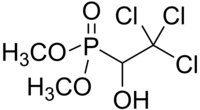Metrifonate
 | |
| Clinical data | |
|---|---|
| Trade names | Chlorophos (and many others)[1] Trichlorfon; Phosphonic acid, (2,2,2-trichloro-1-hydroxyethyl)-, dimethyl ester; (2,2,2-Trichloro-1-hydroxyethyl) dimethylphosphonate; Agroforotox; Anthon; Chlorofos; Chloroftalm; Chlorophos; Chlorophthalm; Chloroxyphos; Combot; Dimethyl (trichlorohydroxyethyl)phosphonate; Dimethyl (1-hydroxy-2,2,2-trichloroethyl)phosphonate; Dimethyl (2,2,2-trichloro-1-hydroxyethyl)phosphonate; Dipterax; Dipterex; Dipterex 50; Diptevur; Ditrifon; Dylox; Dyrex; Dyvon; DEP; DEP (Pesticide); DETF; ENT 19,763; Flibol E; Fliegenteller; Forotox; Foschlor; Foschlor R; Foschlor R 50; Hypodermacid; Loisol; Masoten; Mazoten; Methyl Chlorophos; Metifonate; Metriphonate; Neguron; Neguvon; O,O-Dimethyl (1-hydroxy-2,2,2-trichloroethyl)phosphonate; O,O-Dimethyl (2,2,2-trichloro-1-hydroxyethyl)phosphonate; O,O-Dimethyl (2,2,2-trichlorohydroxyethyl)phosphonate; Phoschlor; Phoschlor R50; Polfoschlor; Ricifon; Ritsifon; Soldep; Sotipox; Trichlorphon; Trichlorphon FN; Tugon; Volfartol; Votexit; Wotexit; WEC 50; (1-Hydroxy-2,2,2-trichloroethyl)phosphonic acid, dimethyl ester; (2,2,2-Trichloro-1-hydroxyethyl)phosphonate, dimethyl ester; (2,2,2-Trichloro-1-hydroxyethyl)phosphonic acid dimethyl ester; Bayer L 1359; Bilarcil; Bovinox; Briton; BAY 15922; Cekufon; Chlorophosciclosom; Clorofos; Danex; Dimethoxy-(2,2,2-trichloro-1-hydroxyethyl)phosphine oxide; Equino-Aid; Foschlorem; Khloroftalm; NCI-C54831; O,O-Dimethyl (1-hydroxy-2,2,2-trichloroethyl)phosphate; O,O-Dimethyl-(1-hydroxy-2,2,2-trichloraethyl)phosphosaeure ester; O,O-Dimethyl-(1-hydroxy-2,2,2-trichlorathyl)-phosphat; O,O-Dimethyl-(2,2,2-trichloor-1-hydroxy-ethyl)-fosfonaat; O,O-Dimethyl-(2,2,2-trichlor-1-hydroxy-aethyl)phosphonat; Phosphonic acid, (1-hydroxy-2,2,2-trichloroethyl)-, dimethyl ester; Proxol; Trichloorfon; Trichlorofon; Trichlorophon; Trinex; Bay-L 1359; Briten; Denkaphon; Dipterex WP 80; Ertefon; OMS 800; Zeltivar; Onefon; O,O-Dimethyl-1-oxy-2,2,2-trichloroethyl phosphonate;Trichlorfon; 1-Hydroxy-2,2,2-trichloroethylphosphonate-O,O-dimethyl ester; Phosphonic acid, P-(2,2,2-trichloro-1-hydroxyethyl)-, dimethyl ester; Chlorak; Dimetox; Dioxaphos[2] |
| Other names | Trichlorphon |
| AHFS/Drugs.com | International Drug Names |
| ATC code | |
| Pharmacokinetic data | |
| Elimination half-life | 3 hours |
| Identifiers | |
| |
| CAS Number | |
| PubChem CID | |
| ChemSpider | |
| UNII | |
| KEGG | |
| ChEBI | |
| CompTox Dashboard (EPA) | |
| ECHA InfoCard | 100.000.137 |
| Chemical and physical data | |
| Formula | C4H8Cl3O4P |
| Molar mass | 257.43 g·mol−1 |
| 3D model (JSmol) | |
| Chirality | Racemic mixture |
| |
| |
| | |
Metrifonate (INN) or trichlorfon (USAN) is an irreversible organophosphate acetylcholinesterase inhibitor.[3] It is a prodrug which is activated non-enzymatically into the active agent dichlorvos.
It is used as an insecticide. According to the US Environmental Protection Agency trichlorfon has been used on golf course turf, home lawns, non-food contact areas of food and meat processing plants, ornamental shrubs and plants, and ornamental and baitfish ponds. Used to control caterpillars, white grubs, mole crickets, cattle lice, sod webworms, leaf miners, stink bugs, flies, ants, cockroaches, earwigs, crickets, diving beetle, water scavenger beetle, water boatman backswimmer, water scorpions, giant water bugs and pillbugs.[4] After reregistration, a number of its uses were voluntarily restricted, and currently, it is used in nonfood areas to control flies, roaches, and ants among other pests. Outdoors it is used on ornamental plants, golf courses, and lawn grass to treat lepidopteran larvae pests, it is also used to treat flies in animal husbandry in areas that are not accessible to animals, it also used to control harvester ants.[5]
It can be used to treat schistosomiasis[6] caused by Schistosoma haematobium,[7] but is no longer commercially available.[8]
It has been proposed for use in treatment of Alzheimer's disease, but use for that purpose is not currently recommended.[9]
Bans and restrictions
[edit]In the United States, trichlorfon/metrifonate may only be used on nonfood and nonfeed sites.[10]
Trichlorfon/metrifonate was banned in the EU in 2008 (Regulation (EC) 689/2008) and in Brazil in 2010.[11]
Trichlorfon/metrifonate was banned in Argentina in 2018,[12] noting that trichlorvon converts to dichlorvos by metabolism in plants, as well as by biodegradation of the soil.
Trichlorfon/metrifonate was banned in New Zealand in 2011.[13]
Trichlorfon/metrifonate was banned in India from 2020.[14]
References
[edit]- ^ "Trichlorfon". Haz-Map. U.S. National Library of Medicine. August 2015. Retrieved 2015-10-13.
- ^ "Metrifonate". U.S. National Institute of Standards and Technology. Retrieved 2016-09-04.
- ^ "NLH - Neurological Conditions - Metrifonate for Alzheimer's disease". Archived from the original on 2009-07-19.
- ^ "Trichlorfon Facts". Pesticides: Reregistration. U.S. Environmental Protection Agency.
- ^ "Trichlorfon". R.E.D. Facts. U.S. Environmental Protection Agency.
- ^ "Monographs: Pharmaceutical substances: Metrifonate (Metrifonatum)". The International Pharmacopoeia Fourth Edition. WHO. Archived from the original on June 3, 2016. Retrieved 2015-10-20. (dead link 31 January 2019)
- ^ "Helminths: Schistosomiasis: Metrifonate". WHO Model Prescribing Information: Drugs Used in Parasitic Diseases - Second Edition. WHO. 1995. Archived from the original on July 15, 2010. Retrieved 2015-10-20.
- ^ Ross AG, Bartley PB, Sleigh AC, Olds GR, Li Y, Williams GM, McManus DP (April 2002). "Schistosomiasis" (PDF). The New England Journal of Medicine. 346 (16): 1212–20. doi:10.1056/NEJMra012396. PMID 11961151.
- ^ López-Arrieta JM, Schneider L (April 2006). López-Arrieta J (ed.). "Metrifonate for Alzheimer's disease". The Cochrane Database of Systematic Reviews (2): CD003155. doi:10.1002/14651858.CD003155.pub3. PMID 16625573.
- ^ "Reregistration Eligibility Decision Trichlorfon" (PDF). Retrieved 2018-08-09.
- ^ "Decision Guidance Document Trichlorfon - Rotterdam Convention" (PDF). Retrieved 2018-08-09.
- ^ "Argentina bans dichlorvos and trichlorfon". Retrieved 2018-08-09.
- ^ "New Zealand bans trichlorfon". Retrieved 2018-08-09.
- ^ "Banned Pesticides in India". 2018-01-17. Retrieved 2018-08-09.
